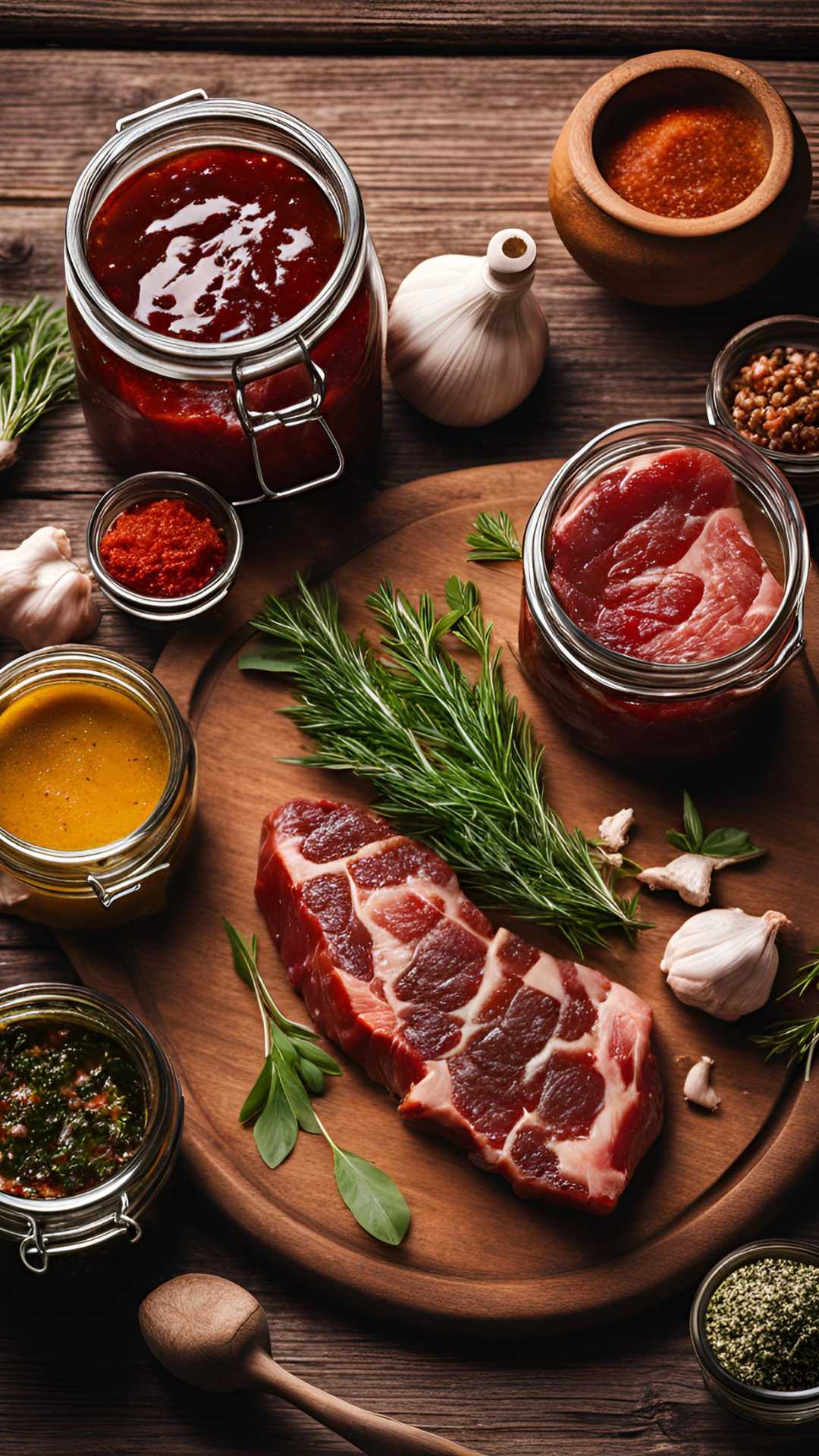Are you prepared to elevate your BBQ skills? Marinating is the key technique that can turn ordinary meats into exceptional culinary creations.
In “The Ultimate Guide to BBQ Marinating Basics: Tips and Techniques,” you will find comprehensive insights into marinades—covering their components, how they function, common misconceptions, and essential techniques.
Whether you are just starting out or have years of grilling experience, this guide offers the resources and inspiration you need to master the art of marinating, ensuring that your next BBQ is truly memorable.
Key Takeaways:
- Marinating is a crucial step in BBQ cooking that helps enhance flavor and tenderness of meat.
- A marinade consists of key ingredients such as oils, acids, seasonings, and sweeteners that work together to infuse flavor and tenderize meat.
- To achieve the best results, it is important to follow time considerations and understand which foods are best for marinating, while also keeping in mind the golden marinating rule.
What is a Marinade?
A marinade is a flavorful mixture typically composed of oils, acids, seasonings, and other ingredients that work together to tenderize and enhance the flavor of meat.
The oil, often olive oil, serves as a carrier that allows the other ingredients to penetrate the meat, resulting in a moist texture. The acids found in vinegar or citrus juices help break down proteins, leading to a more tender result. Various seasonings, including herbs, spices, and even sweeteners, contribute depth and complexity to the flavor profile, enhancing the overall taste experience.
Whether you prefer a zesty citrus marinade or a savory herb blend, each component plays a crucial role in elevating the dish, transforming it into a delightful culinary adventure.
Key Ingredients in Marinades
The key ingredients in marinades consist of a variety of oils, acids, seasonings, and aromatic herbs and spices that work together to enhance the flavor and tenderness of the meat.

Oils such as olive oil or sesame oil are commonly used, as they help to lock in moisture and add richness. Acids like vinegar or citrus juice, including lemon or lime, play a crucial role in breaking down proteins, resulting in a more tender texture.
Seasonings such as soy sauce or Worcestershire sauce contribute a savory umami depth, while additions like garlic and ginger infuse a delightful aromatic essence.
Fresh or dried herbs such as rosemary, thyme, and cilantro not only add flavor but also provide a fragrant character, transforming ordinary meat into a culinary delight. When these ingredients are combined thoughtfully, they create a marinade that not only seasons but also enhances the overall dining experience.
How Do Marinades Work?
Marinades function through a combination of chemical processes that enable flavors and moisture to penetrate the meat, ultimately enhancing its taste and tenderness.
This process relies on several scientific principles, primarily osmosis and diffusion. When you submerge meat in a marinade, water molecules move in and out of the meat tissue, following the concentration gradient, which can lead to increased moisture retention.
The acidic components commonly found in marinades, such as vinegar or citrus juice, are crucial for tenderizing the meat. They break down proteins, making the meat softer and allowing for greater flavor absorption.
As the marinade seeps into the meat, it carries along spices and herbs, imparting a depth of flavor that is both complex and satisfying.
Common Myths About Marinating
There are numerous myths surrounding the marinating process that can mislead home cooks and impact the quality of their BBQ dishes.
One common misconception is that marinating for longer periods always results in enhanced flavor. In reality, most meats typically reach their maximum flavor potential after just a few hours; extended soaking can lead to overly soft or mushy textures. Additionally, many believe that marinating eliminates harmful bacteria, but it is essential to adhere to proper food safety practices. Cross-contamination can occur if marinated foods are not handled correctly, particularly when using the same utensils for raw and cooked foods.
By understanding the science and safety behind marinating, you can ensure that your dishes not only taste better but are also safe to enjoy with family and friends.
Marinating Techniques
You can employ several marinating techniques to ensure that your BBQ meats and vegetables achieve optimal flavor and tenderness. Each technique has its own unique process, allowing you to elevate your culinary creations.
Time Considerations: How Long Should You Marinate?
In terms of marinating, the duration can significantly impact the flavor and tenderness of meat, seafood, and vegetables, making it essential for you to follow specific time guidelines.
For instance, chicken typically benefits from a marinating period of at least 30 minutes to a few hours, depending on the recipe and the desired intensity of flavor. Beef, on the other hand, usually requires a longer soaking time, often ranging from two to 24 hours, particularly for tougher cuts that need extra tenderness.
When preparing shrimp, a marination of just 15 to 30 minutes is generally sufficient, as prolonged exposure can lead to a mushy texture. Vegetables require a shorter marinating time, usually around 15 minutes to an hour, which allows the flavors to infuse without compromising their crispness.
By adhering to these guidelines, you can ensure that each ingredient absorbs the marinade effectively, resulting in a delicious and savory dish.
Best Foods for Marinating
Certain foods respond exceptionally well to marinating, enhancing their flavors and tenderness, making them ideal candidates for your BBQ preparations.
Whether you are working with robust cuts like skirt steak or more delicate options such as fish, the right marinade will infuse these ingredients with delicious seasonings that elevate their taste profile. For seafood enthusiasts, shrimp absorbs flavors beautifully, while tofu serves as a versatile plant-based alternative that can soak up marinades, achieving new heights of savory goodness.
The science behind marinating also tenderizes tougher meats, ensuring that each bite is juicy and satisfying. Different marinades contribute various flavor notes, allowing for a culinary adventure that caters to a wide range of palates and makes your grilling experience truly unforgettable.
Foods Not Recommended for Marinating
While many foods benefit from marinating, certain items do not respond well to this process and can result in undesirable textures or safety concerns.
Delicate seafood, particularly thin fish varieties like sole or flounder, often fall into this category. The tender flesh of these fish can easily break down and become mushy when exposed to acidic marinades for extended periods. Additionally, marinating such seafood poses risks of cross-contamination, especially if the marinade has come into contact with raw fish. This not only compromises the texture and flavor but also increases the risk of foodborne illnesses.
Instead of marinating, consider simply seasoning these types of seafood just before cooking. This approach can enhance their natural flavors while mitigating any associated risks.
The Golden Marinating Rule
The Golden Marinating Rule highlights the significance of both flavor infusion and safety during the marination process to ensure that your BBQ results are both delicious and safe.
This principle guides you in creating flavorful dishes while adhering to safe marination practices that prevent foodborne illnesses. It encourages the use of fresh ingredients and proper sealing of marinades to avoid cross-contamination. Proper storage is crucial; marinated proteins should always be kept in the refrigerator and consumed within designated timeframes to maintain both flavor and tenderness.
Achieving a perfect balance of spices and acidity is essential, as this not only enhances the overall taste but also contributes to an optimal texture, resulting in a more enjoyable meal. The Golden Marinating Rule, therefore, serves as a comprehensive approach for anyone keen on mastering the art of marination.
Creative Marinade Recipes
Exploring creative marinade recipes can unlock new flavors and enhance your BBQ dishes, allowing you to experiment with various ingredients and combinations.
By incorporating a diverse range of herbs, spices, and acidic components, you can significantly elevate your grilling game. For instance, utilizing ingredients like citrus juices, yogurt, or vinegars can tenderize meats while infusing them with aromatic notes.
Combining Asian elements such as soy sauce and sesame oil with fresh garlic and ginger results in a delectable umami flavor, perfect for chicken or pork.
Experimenting with different types of sweeteners, such as honey or brown sugar, can balance acidity and add a delightful glaze. Ultimately, the right marinade not only transforms the surface flavor but also deeply influences the overall savoriness of any grilled masterpiece.
Frequently Asked Questions
What are the basic ingredients for a BBQ marinade?
The basic ingredients for a BBQ marinade include oil, acid (such as lemon juice or vinegar), salt, and spices or herbs. You can also add other flavorings like soy sauce, Worcestershire sauce, or honey depending on your preference.
How long should I marinate my meat?
The marinating time for meat depends on the type of meat and its thickness. Generally, red meats like beef or lamb can be marinated for 1-2 hours, while chicken and fish can be marinated for 30 minutes to 1 hour. You can also marinate overnight for a more intense flavor.
Do I need to refrigerate my meat while marinating?
Yes, it is important to refrigerate your meat while marinating to prevent bacteria growth. Make sure to cover the meat and marinade tightly and place it in the fridge until ready to cook.
Can I use the leftover marinade as a sauce?
No, it is not safe to use the leftover marinade as a sauce since it has been in contact with raw meat. However, you can save some of the marinade before adding the meat and use it as a sauce or glaze after cooking.
How often should I baste my meat while grilling?
It is recommended to baste the meat every 5-10 minutes while grilling to keep it moist and add extra flavor. Make sure to use a clean brush or spoon to avoid cross-contamination.
Can I reuse the marinade for another batch of meat?
No, it is not safe to reuse the marinade from one batch of meat for another. If you want to use the same marinade, make sure to bring it to a boil first to kill any bacteria before using it again.



















































